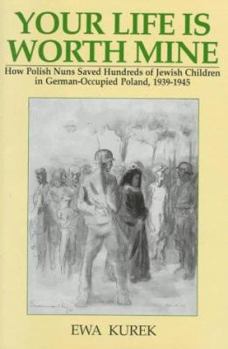Your Life Is Worth Mine: How Polish Nuns in World War II Saved Hundreds of Jewish Lives in German-Occupied Poland, 1939-1945
Polish nuns in nearly 200 religious institutions saved over 1200 Jewish children between 1939 and 1945. In this text, the author has reconstructed the history of these rescues through extensive... This description may be from another edition of this product.
Format:Hardcover
Language:English
ISBN:0781804094
ISBN13:9780781804097
Release Date:January 1997
Publisher:Hippocrene Books
Length:255 Pages
Weight:1.35 lbs.
Dimensions:0.9" x 6.3" x 9.3"
Customer Reviews
3 ratings
Polish Heroism Amidst Unspeakable German Terror
Published by Thriftbooks.com User , 18 years ago
This book provides much detail about the sacrificial life of Catholic nuns and their actions during the war on behalf of the needy children in general and Jewish ones in particular. It also gives the reader a good slice of Polish history during that tragic time. There are widely divergent estimates on the total number of Polish Jews saved by Poles, ranging from 40,000-50,000 (Philip Friedman) to 100,000-200,000 (Joseph Kermisz). Kurek herself assesses the contribution of the Polish Catholic nuns as follows: "Two hundred rescuing convents and more than 1,200 saved Jewish children is tragically few when compared with the extermination of tens of thousands of Jewish children in Poland. Yet when it is taken into account that the rescuers were twenty thousand Polish nuns struggling against similar difficulties and subjected to the same inhuman occupation, the number becomes more significant." (pp. 103-104). Some erstwhile Jewish children recall being subject to traditional church teachings about Jews being responsible for the Crucifixion of Christ. Others strongly repudiate any hints of such an experience (e. g., p. 187). Kurek addresses hurtful accusations, made by some Jewish individuals and groups, that the nuns' motive for sheltering Jewish children was to convert them. She finds no support for this claim, and the testimonies of the Jews themselves do not indicate any pressure or enticement to convert. Of course, Jewish parents and clergy had to individually decide whether death was preferable to the chance that a Jewish child would eventually prefer Christianity solely as the passive outcome of his/her experiences with Catholic "substitute parents". Kurek reminds us that, unlike in most German-occupied countries, the Germans had imposed an automatic death penalty for the slightest assistance to a Jew. In recent years, the nonsensical argument has been advanced, that owing to the fact that Poles commonly risked the death penalty anyway (through such things as engaging in Underground activities) the death penalty could not have been the real reason for more Poles not hiding Jews. To begin with, a Pole was far less likely to be caught for being in the Underground than for hiding a Jew. In addition, as pointed out by Kurek, the Germans, in practice, did not impose the death penalty consistently: "For Poles to fight the Germans in the rank of the underground army, in clandestine activities or in partisan squads, was a sort of ennoblement. It was dangerous. If someone was caught by the Germans, he could be sentenced to death. Yet there was always a chance of survival. One could be taken to prison or a concentration camp, and, once there, escape or survive. But if a Pole was caught helping a Jew, death was certain." (p. 33). In his memoirs, Yitzhak Zuckerman pointed out that he was as often accosted by Jewish szmalcowniks (szmalcowniki), or blackmailers, as Polish ones. In a similar vein, Kurek writes: "And the nuns also knew that among the szma
Very Interesting - memories of nuns & children
Published by Thriftbooks.com User , 18 years ago
This is a great book. The author did a very comphrehensive research, every argument is supported by numerous sources. I enjoyed it a lot! But for a person who is not a scholar or not familiar with the aspects of war in Poland the best it to start reading the book from appendix - with real memories of nuns about children and children about being hidden in the monastery. After that read the chapters. In this way you would have a better understanding of the author's arguments. I was crying while reading some fragments. The book is wonderful, very touchy. It is a comprehensive historical outlook into many aspects of war in Poland.
A Good Read
Published by Thriftbooks.com User , 19 years ago
This book brings to mind the unsung heroes under Hitler's Nazi Regime. Poles were under strict command by German forces not to abet anyone of Jewish origin. The threat of death to anyone found harboring or aiding the Jewish population put many who wished to help in deep jeporady. Polish Nuns with no leadership from Rome took it upon themselves to save as many Jewish children as they possible could without endangering the children already in their care. The book mentions many different congregations who offered "aid" under penalty of death. The book left me wanting to know even more about these wonderful women.






